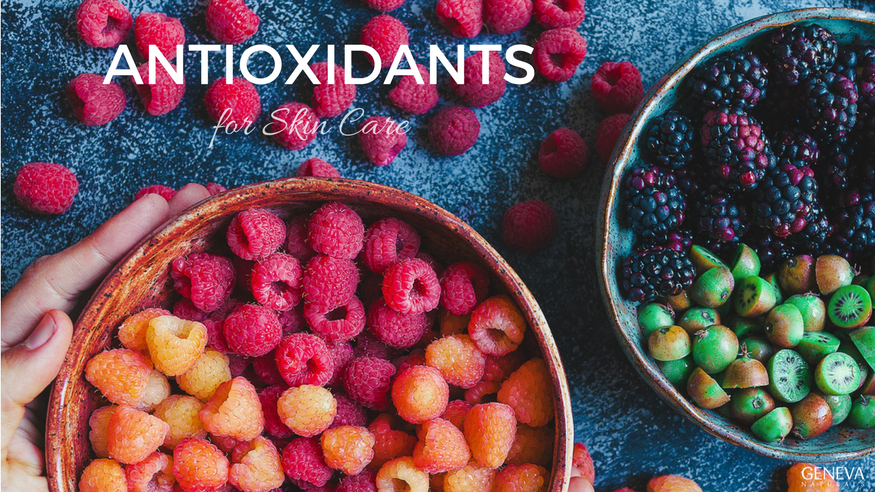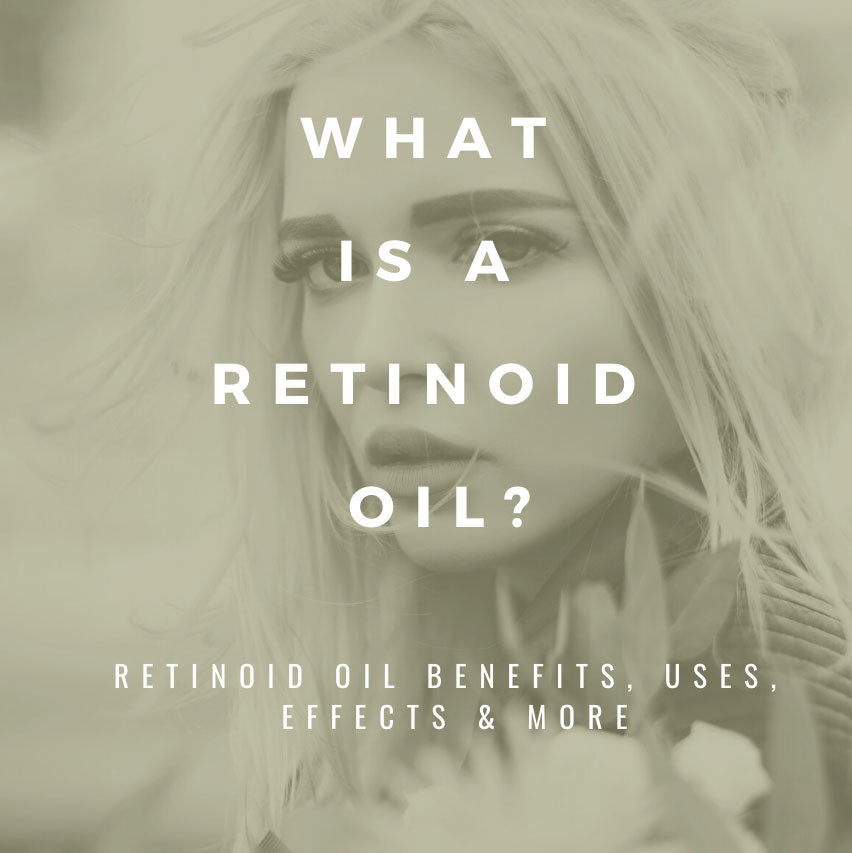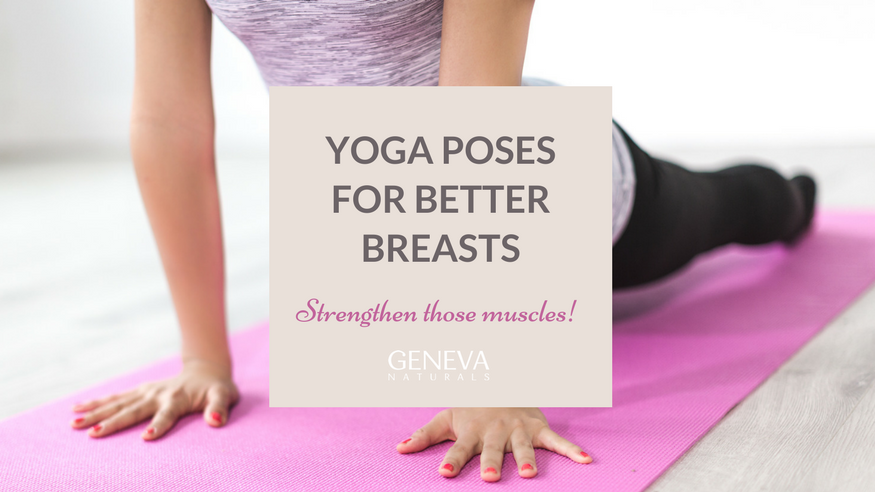Antioxidants for Skin Care


Antioxidants are molecules in your body that keep harmful free radicals in check. Free radicals damage your skin cells, so your antioxidant consumption can show visibly in your complexion. However, it’s important to know that while free radicals have a bad reputation, they are also necessary. The key is balance - finding the right amount of free radicals mixed with the right amount of antioxidants creates an ideal environment in which the body can thrive.
A – Antioxidants can be natural or man-made.
N – Necessary to delay or prevent specific types of cell damage.
T – Traditionally found in many foods, specifically fruits and vegetables.
I – Increasing your intake of antioxidants can greatly improve your body’s ability to prevent dangerous health issues.
O – Oxygen is absolutely necessary for our bodies to survive.
X – Experts (see what we did there?) show there is a dangerous side to oxygen, as well.
I – Ironically enough, as essential as it is for us to have oxygen, it’s also highly reactive and can become dangerous molecules known as “free radicals”.
D – Diseases and cancers are often a side effect of free radicals attacking the body.
A – All organisms use oxygen to metabolize and produce energy for survival.
N – Nutrients found in the form of antioxidants in the food we eat and supplements increase the body’s ability to fight against free radicals.
T – The foods we consume that contain a larger number of antioxidants are more effective in stabilizing or deactivating free radicals.
S – Stress can also cause an imbalance in our body resulting in being less efficient and can lead to many human diseases, such as heart disease.
How do free radicals develop?

- Air pollution
- Cigarette smoke
- Alcohol intake
- Toxins
- High blood sugar levels
- Consuming excessive amounts of polyunsaturated fatty acids
- Radiation (including exposure to UV rays)
- Infections caused by fungi, virus or bacteria
- Excessive iron, copper, zinc or magnesium
- Too much oxygen in the body
- Too little oxygen in the body
- Prolonged and intense exercise
- Excessive vitamins like C and E
- Antioxidant deficiency
What health problems do free radicals contribute to?
- Diabetes
- Premature aging
- Eye degeneration
- Arthritis
- Alzheimer’s Disease
- Parkinson’s Disease
- Heart Disease
- Cancer
- Stroke
- Autoimmune disorders
- Chronic Fatigue Syndrome
- Diminished cognitive response
How do you get antioxidants?

While it seems like there is an endless list of reasons to avoid free radicals while also recognizing we can’t avoid them altogether, there must be a way to coexist and still maintain a generally healthy lifestyle. That is why antioxidants are so important. They are essentially the bridge between the damaging effects of free radicals and the impact on your body. The more antioxidants are present and act as a protective barrier to maximize your body’s function, the better opportunities your body will have to fight infection, the signs of aging, diseases, cancer and other dangerous consequences of exposure to free radicals.
There are 2 ways to get more antioxidants into your body: internally and externally. There are certain foods you can add to your meal plan that will significantly increase the amount of antioxidants your body is receiving. There are also certain products and ingredients you can use in your skin care regimen to boost your antioxidant intake.
Here is the breakdown of the top foods with antioxidants by their ORAC: a score given to food evaluated for antioxidants and their “oxygen radical absorption capacity.”
- Cilantro: 5,100 ORAC score
- Blackberries: 5,300 ORAC score
- Kidney Beans: 8,400 ORAC score
- Artichoke: 9,400 ORAC score
- Cranberries: 9,500 ORAC score
- Elderberries: 14,000 ORAC score
- Wild Blueberries: 14,000 ORAC score
- Pecans: 17,000 ORAC score
- Dark Chocolate (yay!): 21,000 OARC score
- Goji Berries: 25,000 ORAC score
- Thyme: 27,426 ORAC score
- Ginger: 28,811 ORAC score
- Basil: 67,553 ORAC score
- Parsley: 74,349 ORAC score
- Cumin: 76,800 ORAC score
- Cocoa: 80,933 ORAC score
- Turmeric: 102,700 ORAC score
- Oregano: 159,277 ORAC score
- Cinnamon: 267,537 ORAC score
- Clove: 314,446 ORAC score
If you’re looking for a specific antioxidant, there are 18 food types found in a variety of things you can eat. Use the reference below to add specific foods to your diet based on the particular antioxidant you need:
- Allium sulfur compounds: Onions, garlic and leeks
- Anthocyanins: Grapes, berries and eggplant
- Beta Carotene: Mangos, pumpkin, apricots, carrots, parsley and spinach
- Catechins: Tea and red wine
- Copper: Lean meat, seafood, milk, nuts and legumes
- Cryptoxanthins: Pumpkin, mangos and red pepper
- Flavonoids: Green tea, red wine, citrus fruits, onion, apples, and tea
- Indoles: Broccoli, cabbage and cauliflower (cruciferous vegetables)
- Lignans: Bran, whole grain, sesame seeds and vegetables
- Lutein: Leafy greens like spinach and corn
- Lycopene: Pink grapefruit, watermelon and tomatoes
- Manganese: Lean meat, seafood, nuts and milk
- Polyphenols: Oregano and thyme
- Selenium: Lean meat, whole grains and seafood
- Vitamin C: Oranges, kiwi fruit, berries, mangos, broccoli, peppers and spinach
- Vitamin E: Nuts, avocados, seeds, whole grains and vegetable oils
- Zinc: Lean meat, seafood, milk and nuts
- Zoochemicals: Red meat and fish

Antioxidant Supplements
There are also antioxidant supplements that can be extremely beneficial to ramp up the antioxidants in your body. Here are the top 10 high antioxidant supplements:- Astaxanthin – This antioxidant is found in wild salmon and has been shown to have benefits like reducing age spots, supporting joint health, boosting energy levels and even preventing common symptoms of ADHD.
- Chlorophyll – Commonly known as an important ingredient in plants, it’s also very useful to detoxify the body and has been linked to cancer prevention naturally. It helps to protect DNA from damage caused by stress and other toxins. It can be found in leafy green vegetables and blue-green algae.
- Frankincense Essential Oil – Shown as a vital component in the treatment of cancer, frankincense oil has been shown effective against breast, colon, brain and prostate cancers. It promotes healing and can be taken internally, as well, as part of a prevention plan for future health related issues.
- Glutathione – This is the most important antioxidant. It’s found within the cells and can also help boost other antioxidants and vitamins within the body. Glutathione is made up of 3 amino acids that help with protein use, the creation of enzymes, digestion of fats, breakdown of cancer cells and detoxification.
- Lavender Oil – Known for its anti-inflammatory properties, lavender oil helps to produce antioxidant enzymes.
- Lutein – Also found in a variety of foods, as a supplement, lutein benefits the eyes, arteries, skin, heart and immune system. Experts have shown evidence that people with more lutein in their diets are generally less likely to be diagnosed with breast, colon, lung and cervical cancers.
- Quercetin – Found naturally in berries and leafy greens, quercetin poses little risk. Unlike some supplements or other nutrient dense diets, there are nearly no side effects to taking quercetin supplements.
- Resveratrol – This ingredient found in a variety of foods like cocoa, grapes, and dark berries like lingonberries and blueberries. This antioxidant is produced by plans to combat against stress, fungal infection, protecting the heart, injury and arteries.
- Selenium – This trace mineral is found in the soil and may even be in small amounts of water. The adrenal and thyroid glands benefit from support of this antioxidant. It works to fight off viruses and even defend against heart disease and the serious condition, asthma.
- Vitamin C – Known for its powers to boost the immune system, as an antioxidant, it’s no different. Fight against colds, potential cancer, skin, eye problems and the flu.
Antioxidants and Skin Care
Looking for ways to keep your skin youthful? Antioxidants do that.
Trying to reduce the risks of skin related cancers? Antioxidants can do that too.
Replenish skin cells and promote bright, radiant skin? Yes, antioxidants can do that.
Antioxidants have the most noticeable effect on your skin. They help to fight against damage from the sun, slow the signs of aging by helping to keep the skin’s moisture levels balanced and can help prevent additional damage that may otherwise be affected by pollution or a poor diet. Watch this video from Skin Saviour to learn about more ways antioxidants benefit your skin:
The skin care industry has taken notice of the powerful effects of antioxidants and has found ways to incorporate them into your skin care routine for additional antioxidant enforcement. Extracts from foods like grapes, mushrooms, pomegranate and green tea are used in skin care products and contain antioxidants. Loading a product with antioxidant ingredients though – not the right idea. There is a lot of science behind finding just which antioxidants your skin needs and how it can work for you in your skin care regimen.
Antioxidant Factors
Antioxidant stability – Generally, exposure to light is the biggest factor when it comes to breaking down the antioxidants. Specific bottles like opaque or metal packaging helps to reduce the lights impact. There are also ‘use by’ dates on the bottom of every product. While it may not be harmful to use a product after this date, it will be less effective. The time frame of a products ideal lifespan is about 6-12 months.
Absorption – Drinking your antioxidants in the form of a green smoothie are a great way for them to circulate within your body, through the blood and to the cells. But applying the antioxidants may be a little less effective by way of absorption. However, they work to neutralize free radicals that may be affecting the top layers of your skin. So combining the internal absorption of antioxidants with the external application is definitely the most effective.
Concentration – Because there is any number of free radicals working to penetrate the skin depending on what the external stressor is, a blend of different antioxidants is the most effective.

Antioxidants for your Skin Type
How do you know which antioxidant is right for your skin type? There is a key provided below of 9 antioxidants to look for to help you find just what you’re looking for to implement into your skincare regimen based on whatever your personalized skin issues may be.
Coffee Berry: Prevent collagen damage and reduce wrinkles with coffee berry’s anti-inflammatory properties leading to a smoother, youthful looking complexion.
Genistein: This antioxidant is derived from soybeans and has the capacity to inhibit UV damage. It’s applied topically or supplemented orally to be effective at protecting the skin.
Grape Seed: It has been proven even more effective than Vitamins C and E at fighting back against free radicals, grape seed comes from vitis vinifera.
Green Tea: Used for everything from heart disease to skin aging and weight management, applying green tea to your skin can help to reduce damage caused by the sun, minimize inflammation and attack free radicals. Green tea cannot be used as a sunscreen, but works to reduce existing damage and prevent future damage.
Lycopene: It works to improve your skin’s texture and also promotes collagen production. It helps to reduce damage to DNA which leads to premature signs of aging. Add a daily supplement to your diet in addition to a skincare product containing lycopene and you will feel the powerful effects of this antioxidant.
Niacinamide: Also known as Vitamin B3, it’s a powerful antioxidant with anti-inflammatory properties that are also effective at depigmenting. It helps to improve overall skin texture and tone, as well as reduce wrinkles and hyperpigmentation.
Resveratrol: When applied topically, resveratrol has been shown to protect against UVB damage.
Vitamin C: It has been proven effective at preventing and even reversing the signs of aging. As an antioxidant in addition to a collagen booster, this is essential at maintaining a youthful appearance. It’s common in a lot of skincare products because of its effectiveness and proven results.
Vitamin E: Boost collagen production and reduce the appearance of fine lines and wrinkles with ramping up your Vitamin E intake. Watch for skin care products that contain Vitamin E, such as this anti-aging serum, that can work to penetrate the skin and have even more dramatic effects when you’re seeking a more youthful appearance.
A few things to keep in mind, as with any new products or changes to your skincare regimen… Each person’s skin is unique and it may take trial and error to find the right combination of products and ingredients that work for you. Implementing some strategies to improve your antioxidant intake through your diet is a great way to get your body started on healing and fighting against those free radicals. Your diet, coupled with some new and effective products containing antioxidants can be just the recipe you need to get the smooth, glowing complexion you’ve always wanted.
Make sure you're always getting enough antioxidants - save this pin!

Also in Geneva Naturals

What Is A Retinoid Oil? Retinoid Oil Benefits, Uses, Effects & More

DIY Clay Mask Recipes for Clear Skin


